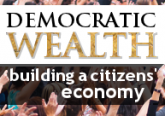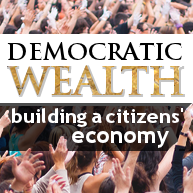Meaningful work is an ideal with a long history. It retains a strong hold upon the popular imagination. Whether it is work which is useful, involving, worthwhile, satisfying or inspirational, we all know meaningful work when we see it. Generally, we think of meaningful work as a luxury good or scarce resource – something a few lucky people possess, and which is simply a matter of private interest. We do not think of meaningful work as important for social development, or take seriously the possibility that all work ought to be meaningful. This is despite the fact that having to do non-meaningful work harms a person – including poor health outcomes, frustrated human capabilities, diminished life chances, or even the absence of a sense that life is worth living. And in any case, since most of the work we do is irretrievably dull, repetitive or subject to hierarchical authority, hankering after meaningful work for everyone seems unattainably utopian.
With all this in view we might agree that a meaningful life is possible, but instruct one another to search for it in other dimensions of living other than work, such as family, politics or community. But this ignores the way in which our society makes work central to life, holding out the promise of it being a source of satisfaction and personal fulfilment, as well a necessity for survival and for flourishing. Work promises much, but often fails to deliver. The failure is not simply a private individual loss, but affects the shape of our lives as a whole, because work provides the status and capabilities for us to be able to play our parts in the spheres of family, politics and community.
I will argue that this failure is not inevitable. If so, how can changes to institutions give us access to meaningful work? This is not a new question. TheDemocratic Wealth series has been exploring it through the idea of a republican economy – see for example Alex Gourevitch’s piece on the experiments of modern republican activists in the labour movement. This piece will attempt to further the inquiry, laying out the framework needed for meaningful work, and giving some concrete examples of institutions that have attempted to approach this ideal.
What is meaningful work?
Let’s take a closer look at what meaningful work is. Work is meaningful when itunites subjective feelings of attachment to the objective worthiness of the work, or, as Susan Wolf puts it in her book Meaning in Life and Why it Matters, ‘meaning arises when subjective attraction meets objective attractiveness.’ So, a person may be a brilliant space scientist, but be yearning for a career on the stage. This individual’s achievements in science add to the value of her life, and may be publicly endorsed by others as valuable through awards and prizes, but, without emotional attachment, her achievements do not add to the meaningfulness of her life. Equally, strong emotional attachment to a worthless project, or a project which does not have a care for others, will not make such activities meaningful.
Meaningfulness is not given automatically, but is made during the course of everyday living by people exercising their capabilities as meaning-makers and creators of value. Of course, people disagree with one another over what does or does not have positive value. These differences will remain private, individual and obscure, unless brought into public deliberation through a system democracy. This is an important point to which I will return below.
Workplace democracy and meaningful work
The aim of creating an economy free of domination is closely tied up with the project of creating an economy in which all can enjoy meaningful work. As the political philosopher Philip Pettit argues, domination occurs when one party has the power to interfere arbitrarily in the actions of another. Dominating relations are harmful because they threaten our vital interests. The threat of arbitrary interference forces people into a permanent state of insecurity, causing them to expend considerable effort in the attempt to protect themselves from unpleasant consequences, such as voluntarily giving up valuable goods or upward management of superiors. As Christopher McMahon puts it in Authority and Democracy: ‘subordinates are expected to be adept at reading the wishes of their bosses and putting them into effect without being told in so many words to do so.’ People become clever at heading off the possibility of being interrupted in their work and lives. But this cleverness involves a distortion in the way our capabilities as workers are developed. Work which fosters this kind of tactical cleverness is not meaningful.
Simone Weil observed how factory work involves this combination of oppression and frustration of capabilities: ‘since orders are now the sole factor making for variety, to eliminate them in thought is to condemn oneself to imagining an unbroken succession of ever-identical movements, to visualising monotonous desert regions of experience that thought has no way of exploring’ (from the essay Factory Work; see the Simone Weil Reader). Contemporary work, although in the UK typically rather different to the factory work experienced by Weil in the 1930s, is nonetheless riven with relations of domination, even if the means of domination are rather more subtle than the old command and control hierarchies of factory line production. Today, domination often works through the reproduction of ideologies which shape our identities, our sense of who we are, in order to extract our commitment and discretionary effort rather than to satisfy our interests in experiencing work which is autonomous, free and dignified.
It’s important to note that people whose meaning-making capabilities have been thwarted might still strenuously seek to reinterpret their work, circumventing rules and hierarchies to deliver good work to customers, or to help out a colleague. For example, a study of hospital cleaners in the US by Amy Wrzesniewski and Jane Dutton found that, despite the low social valuation of their work, some cleaners sought to positively re-value their work as skilled and worthwhile by actively engaging in tasks which supported patient recovery, including interacting with patients, visitors and nurses.
This is very suggestive. Consider how a system of workplace democracy might act as a vehicle to release marginalised meanings, permitting people to make them part of their practical identities and enabling them to participate in public revaluations of their work. Democratic meaning-making helps the search for meaning in work to achieve validation in a public forum, and it publicly affirms the status of each worker as someone capable of contributing as a co-maker of meaning in work.
Democratic workplaces in practice
What would institutions able to foster meaningful work look like? Cooperatives and mutuals can be viewed as attempts to approach this ideal. Their co-ownership principle, governance architectures and organisational practices mandate member participation. In his book, People-centred Businesses, Johnston Birchall defines a mutual as a member-owned business that is ‘owned and controlled by members who are drawn from one (or more) of two types of stakeholder – consumer and producer – and whose benefits go mainly to these members (p.4)’. Mutuals attempt to achieve social, as well as economic, purposes through the provision of a range of member benefits, which, in a producer cooperative, should include the benefit of meaningful work.
Mutuals often fill gaps in the provision of social and economic necessities, providing organisational vehicles for people to collectivise their needs, and making self-help the key to creating sustainable businesses. They have to operate in a business-like manner, generating profits, but because the activities are funded by members there is no external investor, meaning that the surplus can be used to create sustainable reserves, provide well-being benefits to members, their families and communities, or to distribute as a dividend. In order to sustain the democratic model of representation and member control of the purposes and means of the organisation, creating a member community is vital. This requires the formation of a background culture and values based upon fairness, equality and mutual respect, so that all members can feel confident of their status when taking up their responsibilities as co-owners.
Thus, mutual enterprises, by creating multi-stakeholder democratic communities grounded in co-ownership, exceed the involvement and participation strategies pursued by investor-owned companies in order to increase employee engagement or improve customer loyalty. When they are able to pull off the difficult organisational discipline of mutuality, mutuals experience not only instrumental benefits, such as improved quality in decision-making, but also intrinsic benefits, such as the solidarity and feeling of belonging generated by the sense of sharing in a common fate. They also provide valuable opportunities for people to gain experience in looking beyond their private concerns – an important condition for republican citizenship.
In their study of Mondragon, ‘Enabling Ethical Economies: Cooperativism and Class’, J.K. Gibson-Graham argue that we should see economic life as diverse, and seek to understand how our multiple roles of worker, carer and citizen break down traditionally conceived boundaries. Rather than opposing already existing capitalism with an alternative, we should envision how diverse modes of exchange and cooperation are already implicated in our economic life, so that the task is to strengthen already present tendencies towards non-capitalism in the existing system. Examining the Mondragon regional system of cooperation, Gibson-Graham observe that there is no specialisation of product, function or organisational form, but a knitting together of the ‘regional economy as a complexly differentiated and networked whole’. They quote Father Arizmendiarrieta, the Roman Catholic priest responsible for setting up the first Mondragon cooperatives, who said: ‘in the mind of the co-operator is the idea that future society probably must be pluralistic in all its organisations, including the economic.’
We need to learn from such examples and insights. As universal welfare provision breaks down in the aftermath of the financial crisis, unmet need is once more proliferating. In response, contemporary mutuals are innovating with mixed models, such as combining employee-ownership with traditional member ownership, thereby seeking to engage all those affected in the common purpose of the organisation. In the UK public sector, the class of mutuals now contains, amongst others, NHS Foundation Trusts, Leisure Service mutuals, Primary Care mutuals, and Co-operative Trust Schools. Moreover, there is increasing recognition that the health of sectors, such as banking, depend upon there being a diversity of ownership forms, in order to balance risk with stability, short term with long term decision-making and to provide for financial inclusion.
What does the future hold?
The features of a socialised mutual economy are beginning to emerge – one characterised by a new kind of economic citizenship, grounded not only in an entitlement to a share of decision-making power, but also in an obligation to participate in the maintenance of a public life which allows democratic organisations to be sustained and reproduced. But such an economy is possible only under conditions of non-domination, achieved when organisational authority is democratically authorised and worker participation is uncoerced. I have argued that democratically organised work which enables everyone to share in decision-making has the potential to be meaningful work. Mutuals hardwire democratic participation, and this makes them key organisational forms for proliferating meaningful work. This matters not only because being a meaning-maker develops capabilities essential to republican citizenship. Experiencing freedom as non-domination is part of feeling that one’s life is worth living.
This piece is part of the Democratic Wealth series, hosted by OurKingdom in partnership with Politics in Spires.





No Comment